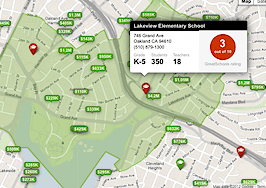One bummer about local data that’s an increasingly important part of online real estate search is that a lot of the time, it’s served up in areas with predetermined boundaries, like a neighborhood or census tract.
But what if one corner of a neighborhood differs sharply from the rest of the neighborhood, and closely resembles a small part of an adjacent neighborhood?
Homebuyers could soon be discovering such enclaves using boundary-transcending search tools powered by APIs (application programming interfaces) developed by Coral Gables, Florida-based URBAN4M.
URBAN4M today released beta versions of the APIs in three markets: Miami, Boston, and Austin, Texas. But the company, which sells data sets wrapped into its “locations-analytics” APIs, plans to roll out more data sets for other metro areas in the coming months.
Should real estate websites integrate the APIs — part of URBAN4M’s product aboutPLACE — that could make it possible for people to search for areas or listings based on criteria including safety, school quality, demographic composition, and proximity to businesses and public transit.
URBAN4M said it’s in talks with several companies that might want to utilize the APIs, which it declined to name. Potential clients include website developers, multiple listing services, real estate websites and real estate developers.
Firms like Maponics and Onboard Informatics already offer data sets that can enable website developers to offer listing searches based on lifestyle criteria like school quality.
But the aboutPLACE APIs enable developers to integrate more lifestyle considerations into their search tools, said Hillit Meidar-Alfi, founder and CEO of URBAN4M, and allow users to pinpoint desirable areas with greater precision.
By ignoring the arbitrary boundaries of predetermined areas like neighborhoods and census tracts, search tools powered by the aboutPLACE APIs could help buyers and renters avoid writing off an entire neighborhood that might include an enclave that fits their lifestyle criteria. It could also help them avoid homes or apartments that they thought fit their criteria but do not.
URBAN4M’s data set “gives us the flexibility and the malleability to build places and be able to explicitly tell what is going on in that amorphic shape,” Meidar-Alfi said.
While URBAN4M is currently offering this level of precision through APIs, it plans to roll out a consumer app in January that would put the company in competition with search site NeighborhoodScout. URBAN4M’s app would allow users to single out areas that match their preferences, but won’t display listings, Meidar-Alfi said.
In addition to powering lifestyle-based search, aboutPLACE’s APIs can rate locations on different quality-of-life indices, such as walkability, safety, school quality and proximity to public transit — much like some other data providers.
AboutPLACE APIs can also present a detailed description of an area to capture its “vibe.” The summaries run in the vein of local descriptions that appear on listing portals and NeighborhoodScout, but Meidar-Alfi maintains that they’re more nuanced.
But is it even possible to capture a “vibe” relying solely on data? Isn’t a “vibe” something you see and feel?
“It’s not necessarily what you think of it, or what I think of it,” Meidar-Alfi said. “A place has its own character.”
The vibe summaries are supposed to answer questions such as whether a place is suitable for families, or is perhaps better for the 40-plus single life?
AboutPLACE’s APIs encompass demographic data including age, income, households with kids, and renter-to-homeowner ratios. But notably, the APIs don’t include racial data.
As the Department of Housing and Urban Development and National Fair Housing Alliance review the use of demographic data by real estate sites and apps, the question of whether it’s acceptable to stitch racial data into real estate search products has become a subject of debate.
Nearly 60 percent of respondents to an open Inman News poll have indicated that they don’t believe racial data should appear on real estate search sites.
“We don’t deal with race,” Meidar-Alfi said. “It comes from my background in planning and urban design. I find that that could be used negatively too easily and it’s just something that, at least for now, to hold off on.”
Meidar-Alfi also decided not to add sex offender data into aboutPLACE’s APIs. Like some data experts, she says sex offender data is unreliable and “can falsely give a very negative feel to a place.”
“I know for a fact that brokers can be very unhappy with it, and I understand” why, she said.



